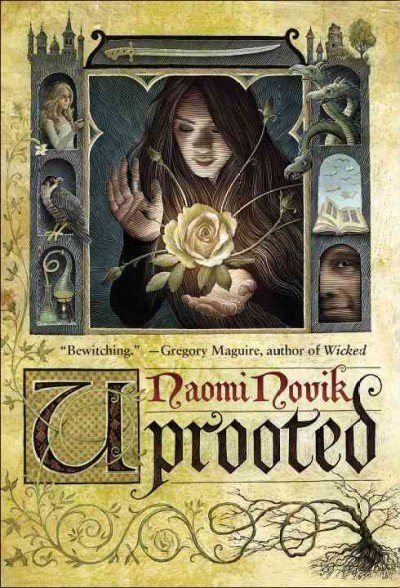If it wasn’t for the fact my fiancée gave away her personal copy of “Uprooted” three times over the holiday season as gifts to friends and family, I could have easily read it at least twice more, and she would have had her nose stuck in it for a month straight.
Yes, Naomi Novik’s newest book is really that magical.
It surprised me that “Uprooted” is Novik’s first novel that deals with high fantasy (or is based in a world of its own, completely unrelated to our reality) because she was able to create an entire world that has enough detail to be intellectually and emotionally satisfying and have a fulfilling plot line, but was able to do this all in one book without it feeling rushed or forced.
The story is told by 17-year-old Agneiszka, who lives in a small village in the country of Polnya. Her village, and many others, live on the edge of the dark and evil Wood.
A wizard named the Dragon protects these villages from the Wood, but every 10 years, he takes the most beautiful or most talented girl from all the villages away into his tower in exchange for his services.
Agneiszka is one of many girls who are being offered to the Dragon, but everyone knows he will choose her best friend Kasia, the most beautiful and talented girl in all the villages.
So it comes as a shock to everyone (but the reader) when the Dragon instead takes long-faced, clumsy, dirty Agneiszka back to his tower instead.
Some more cynical fantasy readers, who have read more than their fair share of clichés concerning wizards, magic and young, impressionable girls being taken by a stony but secretly caring and passionate older man may assume this book is heading in the same direction many others have.
In some ways, they’re right – a few clichés are touched on, a few tropes are used. But in the important ways, they’d be wrong and miss out on what really makes this book stand apart from many of the recently published fantasy and sci-fi books featuring female heroines.
Much of the magic of “Uprooted” comes from the relationship Agneiszka has with her friend Kasia – it’s a love between friends which drives a huge part (if not all) of this story forward, something I don’t come across often, especially when it comes to women. Think Sherlock and Watson, or Sam and Frodo, but obviously with women instead of men.
One reason we don’t see such close female friendships in books (and in media in general) is because authors put a much heavier focus on romantic relationships.
In general, there’s nothing wrong with books focusing on romantic and sexual relationships over friendships, and yes, the development of a romantic relationships can be one of the more interesting ways to make characters come to life.
But much of the society we live in today also prioritizes romance and sex over building healthy, platonic relationships, and it’s affecting how we act in our daily lives, men and women both, but especially women.
This sends the message that romance and sex is more important than your friendships, and that all other relationships should be sidelined to give a romantic relationship the lion’s share of your attention.
Consider the Bechdel Test and its three requirements; that there must be two (named) women in the work of fiction being tested, the two women communicate with each other, and they talk about something besides a man at least once.
Out of more than 6,310 movies reviewed on bechdeltest.com, roughly 58 percent of those meet all three of the requirements, 10 percent of those movies pass two of the requirements, 22 percent only passing one and another 10 percent meeting none of the requirements.
That’s around 2,560 movies where if there are two women in the movie, if those women are named, and if they talk to each other, they only talk about men.
And I’d bet dollars to doughnuts the majority of the men those women discuss are part of a romantic plot.
That’s a strong message. It tells me that platonic relationships between women are unimportant. It tells me the only relationship worth having is romantic.
And that message is completely untrue, which is why Novik’s heavy focus on Agneiszka’s relationship with her best friend, and the author’s use of that relationship to drive the story forward, was so refreshing to me and inspiriting for my fiancée. After all, she gave her own copy of “Uprooted” to three other women in her life; her mother, my sister and a close coworker, and is working on gifting another to her best friend, as soon as several large bookstores no longer have a long list of back orders to fill.
I’d like to see more authors take a leaf from “Uprooted” and think about what relationships should be most important to their readers.


